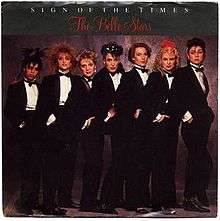Sign of the Times (The Belle Stars song)
"Sign of the Times" is a song by English pop/new wave band The Belle Stars, released as the fourth single from the band's only self-titled studio album. It was their seventh single overall and first single that was an original song since 1981's "Another Latin Love Song". Its lyrics describe the band explaining how they feel their lover is unfaithful of their love, hence the lyric "You say you love me, but want success." The single was the band's only top ten hit, reaching #3 on the UK Singles Chart in the week of 19 February 1983.[1] It peaked at #75 on the Billboard Hot 100 in the week of 14 May 1983.[2]
| "Sign of the Times" | ||||
|---|---|---|---|---|
 | ||||
| Single by The Belle Stars | ||||
| from the album The Belle Stars | ||||
| B-side | "Madness" | |||
| Released | December 30, 1982 | |||
| Format | 7", 12" | |||
| Recorded | 1982 | |||
| Genre | New wave | |||
| Length | 2:56 5:50 (Extended Remix) | |||
| Label | Stiff | |||
| Songwriter(s) | Lesley Shone, Jennie Matthias, Miranda Joyce, Sarah-Jane Owen, Judy Parsons, Stella Barker, Clare Hirst | |||
| Producer(s) | Peter Collins | |||
| The Belle Stars singles chronology | ||||
| ||||
Background
In 1982, The Belle Stars released three cover versions: "Iko Iko" by The Dixie Cups, "The Clapping Song" by Shirley Ellis, and "Mockingbird" by Inez & Charlie Foxx. Dave Robinson at Stiff Records, the band's record company, suggested that the band ought to perform covers to attract audiences, then after three covers write their own song, and it would be a hit. This happened to come true when the band released "Sign of the Times".
Music video
The music video for the song was produced by Pete Collins. It features Stella Barker talking while staring in mid-air, and then shows Jennie Matthias popping out from below and singing. The video then centres on the band in an abandoned nightclub, wearing tuxedos and snapping their fingers. During the lyric "you give me nothing more than a shove", the band members perform the sign language gesture for "shove". This motion is shown throughout the rest of the video.